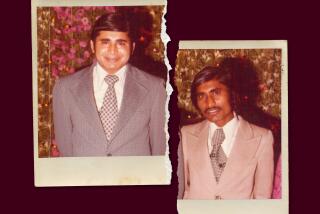Encino Man Gets 2 1/2 Years for Role in Exports to Iran
- Share via
A tearful Encino man who was once a multimillionaire architect to the shah of Iran was sentenced to 30 months in federal prison Monday for conspiring to illegally export $4 million in military radios and spare parts from the United States to the Iranian government of Ayatollah Ruhollah Khomeini.
U. S. District Judge Alicemarie H. Stotler also ordered the man, Khosrow Shakib, 43, to pay a $10,000 fine and to undergo counseling for severe depression.
Shakib interrupted his trial after less than an hour of testimony on July 23 and the next day pleaded guilty to a charge of conspiring in 1983 and 1984 to smuggle into Iran 2,000 portable radios and components, marked as telephone equipment.
Acted as Middleman
The Iranian expatriate said he knew it was against U. S. law to export AN-PRC-77 radios, usually made for the U. S. Army, without a license. Shakib admitted that he acted as a middleman between Hormoz Hezar, 51, of Beverly Hills and Steven Sanett of Hidden Hills, owner of Aero Electronics store in Los Angeles.
Before being discovered by U. S. Customs Service agents, Shakib and the others made a dozen partial shipments of about 50 complete radios and about $500,000 worth of parts by shipping them through Canada to a West German company owned by Hezar, the government said.
Sentences ranging from two years in prison to probation were handed down for Sanett and two of his employees, who all agreed to testify for the government. Hezar also pleaded guilty and will be sentenced in November.
Shakib’s lawyer, Sherwin C. Edelberg, argued that Shakib should be placed on probation because of the remorse his client feels and because there is “no question,” he said, that Shakib will not commit the same offense again.
But Assistant U.S. Atty. Jeffrey Modisett said Shakib started the whole conspiracy and had been very active in it. He urged the court to consider the deterrent value of Shakib’s being sentenced to prison, not only in reference to members of the Iranian community who might be pressured to help the Khomeini government, but also to military-equipment suppliers.
Stotler suggested that Shakib wanted to restore his name and fortune, but now finds himself “in a web of conspiracy.” Shakib’s situation evokes great sympathy, she said, and he appears remorseful. But, she said, “it’s too late, and we’re beyond that.”
Shakib appeared dazed and shaken as a U. S. marshal took him into custody.
More to Read
Sign up for Essential California
The most important California stories and recommendations in your inbox every morning.
You may occasionally receive promotional content from the Los Angeles Times.












